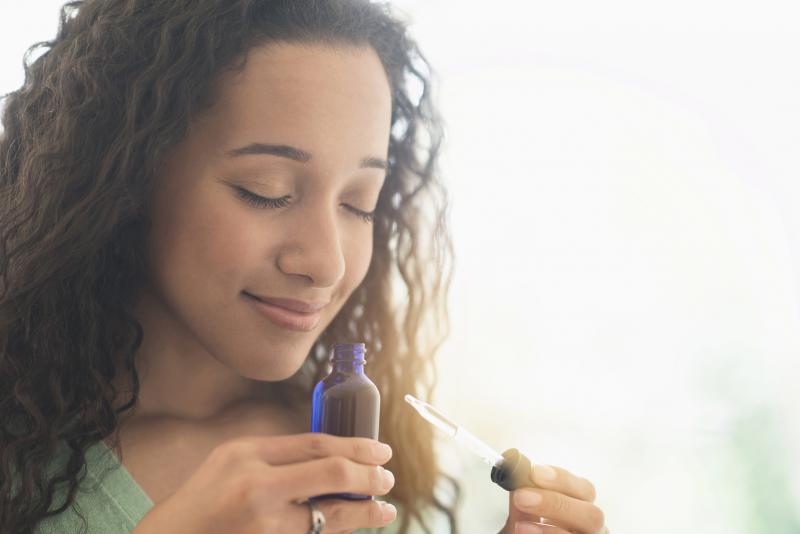- Aromatherapy may help a number of conditions including stress, anxiety, headache, and nausea.
- Some popular aromatherapy oils include lavender, tea tree, peppermint, and eucalyptus.
- Be careful when diffusing essential oils for aromatherapy as it can be dangerous for pets and children.
Aromatherapy, aka essential oil therapy, has gained popularity in recent years as an effective way to relieve stress and other ailments, like headaches and nausea.
However, research on how well aromatherapy may help relieve stress and anxiety is still emerging. Regardless, if you know the risks and use it correctly, aromatherapy may be worth trying.
Does aromatherapy work?
Aromatherapy may help relieve stress, but study results are mixed and more concrete research is needed, says Stacie Stephenson, DC, CNS, chair of functional medicine for Cancer Treatment Centers of America. Here’s what some of the research has shown so far:
- A small 2013 study found that nurses who pinned small bottles of 3% lavender essential oil to the front of their clothes reported fewer symptoms of stress over three to four days than the control group.
- Another small 2016 study found that inhaling two drops of lavender essential oil in distilled water for 20 minutes increased feelings of contentment and reduced levels of the stress hormone, cortisol, in candidates for open-heart surgery.
- Not all research agrees, however. A 2015 study found that aromatherapy had no effect on stress, but that the expectation of receiving aromatherapy actually did lower stress, whether or not the subjects actually did end up receiving it.
In addition to stress relief, research suggests that aromatherapy may also help treat:
- Pain
- Mental fatigue
- Anxiety
- Depression
- Headaches
- Nausea
- Inflammation
However, it’s important to note that not all proclaimed benefits of aromatherapy are substantiated. It’s important to note that evidence is lacking for claims that aromatherapy can also treat heart disease or Alzheimer’s disease.
How to use aromatherapy
There are a few different ways you can practice aromatherapy, including lighting a candle, using an essential oil diffuser, or getting a massage with essential oils.
Here are some of the most popular ways to use essential oils for aromatherapy:
- Diffuse essential oils. Diffusers evaporate essential oils into the air, spreading the scent throughout the room. Diffusers come in all kinds of different sizes and models, but in general, most recommend diluting a few drops of the oil in water before diffusing. You can do this with any type of essential oil, says Elizabeth Trattner, AP, DOM, a doctor of Chinese and integrative medicine with her own private practice. But the most common ones include lavender, eucalyptus, and peppermint.
- Inhale the scent from the bottle. This method is pretty straightforward. You simply inhale the aroma after opening the essential oil bottle, Stephenson says. Some scents, like tea tree oil, ginger, or frankincense can be pretty potent, so if you are sensitive to strong smells, this may not be the method for you.
- Apply essential oils topically. You can also apply essential oils directly to your skin, though there are some precautions to keep in mind with this method. First, essential oils are highly concentrated, so you should always dilute with a carrier oil, like coconut oil or jojoba oil to avoid skin irritation. Secondly, some people experience allergic reactions to essential oils. Seek medical attention if you notice hives, redness, or itching after using essential oils topically.
Other methods include lighting essential oil candles, getting a massage with essential oil, or adding a few drops to a bath.
Stephenson does not recommend ingesting essential oils as some oils can be dangerous when consumed.
Popular essential oils
There are dozens of different essential oils to choose from, but some of the most popular include:
- Lavender. Diffuse this at night to help promote sleep.
- Eucalyptus. Trattner does not recommend using eucalyptus oil directly on the skin as it can cause irritation, but you can add a couple drops of this to a shower for a spa-like feel.
- Peppermint. This scent may be beneficial in relieving headaches. You can diffuse it or dilute it in a carrier oil and apply it to your temples.
- Tea tree. Tea tree oil may help treat acne, but it is highly volatile, Trattner says, so always use it with carrier oil.
- Rose. This scent is a beauty favorite and commonly used in perfumes, lotions, and creams, Trattner says.
- Chamomile. Diffuse this soothing scent to help wind down in the evening.
- Lemon. Many people find lemon to be a natural mood booster. Burn a lemon candle in your kitchen or diffuse this scent throughout the house.
- Clary Sage. Research indicates clary sage may be helpful in reducing stress. You can dilute it and apply it directly to your skin or spray it onto a cotton ball and inhale.
Risks of aromatherapy
Aromatherapy is a relatively safe way to relieve stress, Stephenson says, but some people are more at risk of complications, including children, pregnant people, and pets.
Peppermint oil for example should not be used on children younger than 30 months as it can increase the risk of seizures.
Some oils may also be harmful to pets, depending on the size of your pet and the concentration of the oil you are using. For example, tea tree oil can be toxic to both cats and dogs. Therefore, essential oils should be kept out of reach of animals when diffusing and never applied topically to pets.
Some essential oils are considered safe to use during pregnancy, like lavender and ginger, but others may be harmful, like clary sage or peppermint. Pregnant people should always consult with a doctor before using essential oils during pregnancy.
Lastly, inhaling essential oils – whether it’s directly or you’re using a diffuser – may aggravate allergies or nasal congestion. So, stop if you experience worsening symptoms.
Best essential oil diffusers
We test and recommend the best essential oil diffusers. Check out our favorites.
- The best essential oil diffuser overall: Vitruvi Essential Oil Diffuser
- The easiest-to-use essential oil diffuser: SpaRoom Mysto Ultrasonic Essential Oil Diffuser
- The best budget essential oil diffuser: UR Power Essential Oil Diffuser
Insider’s takeaway
Aromatherapy may help a number of ailments from stress and anxiety to headaches and nausea.
And except for certain set groups, like young children and pregnant people, aromatherapy is relatively safe to try regardless of whether it has strong scientific backing or not.
“Whether these effects are mostly the placebo effect or not, we really don’t know for sure,” Stephenson says. “But does it matter? If they have this effect, then they may be worth using.”
You can use aromatherapy by diffusing essential oils, lighting candles, or applying essential oils directly to the skin.
Just remember that in certain cases, like when applying topically, to dilute the oil as some of them can be extremely potent and may cause irritation if not diluted.Steam inhalation: How to use fresh herbs to make your own home remedy for congestion relief 5 health benefits of aloe vera, from healing sunburn and reducing acne to helping with digestion 15 simple and effective ways to relieve stress The difference between dopamine, serotonin, endorphins, and oxytocin – and how each one helps you feel happy





































